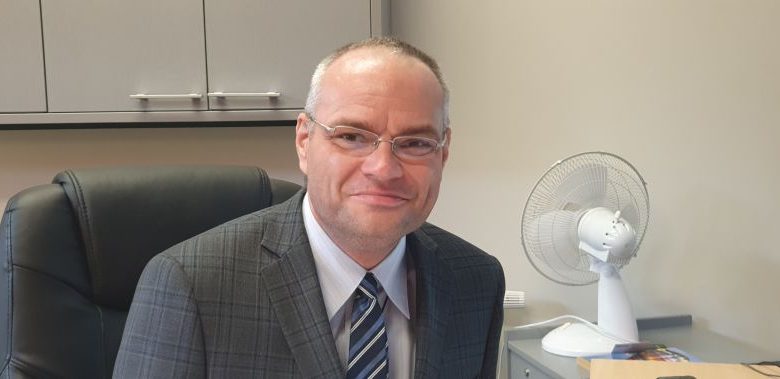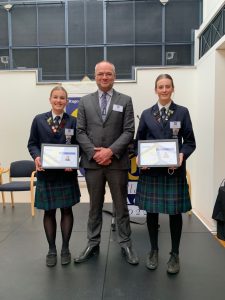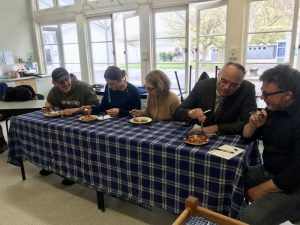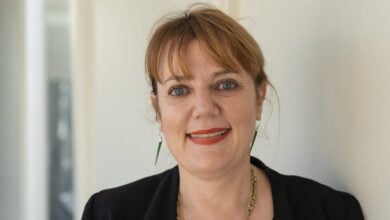Principal Speaks: Stories, not statistics
Principal Paul McDowall of Roxburgh Area School on how teaching is about knowing the people in front of you.

In this month’s Principal Speaks column, Roxburgh Area School Principal and English teacher Paul McDowall writes on people-centred learning.
Read the latest print edition of School News HERE
Success comes in many forms
Last year, some research came out that said rural schools achieve less highly than urban schools because a higher percentage of urban students gain University Entrance (UE). For one student, success might be UE. But at a rural school like Roxburgh Area School, we often have students who leave at Year 12 and go into jobs or apprenticeships. For the teaching team that’s a success, because for the students it’s a success.
That doesn’t mean rural schools don’t have academic success — quite the opposite. This year we’ve got three Year 13s, all of whom are going on to the University of Otago to do Health Sciences. They’ve all got UE and they’ve all got scholarships. They’ve done really well academically because that was their goal. But it’s not a universal one.

I believe that teaching is about knowing the people in front of you. What motivates them, and what interests them? Getting to know people better is exactly where teaching is headed in Aotearoa. The whole local curriculum push is about knowing what your students bring, what their interests are, what their needs are and how you can draw on your community.
Individual stories; individual learning; individual success
People’s stories get lost in the statistics of student retention rates, UE attainment, and NCEA attainment.
For some young people who have never been outside of the small community, success looks like the job that mum, dad, uncle or someone else does. To be able to follow in the footsteps of their whānau is a great success. For other people, it’s breaking away from those long-standing traditions. Someone might come from generations of shearers. For that young person to see themselves as a mechanic, a painter or a plumber, is a success. And for other students, just getting to school every day is a success. It’s not all about getting everyone to achieve UE.

At Roxburgh Area School we see these stories and these different measures of success all the time. Some young people don’t have a great time at school. At Roxburgh Area School, when they get to Level One NCEA we might not let them go on study leave near the end of the year. We might keep them behind to do some extra work, with the support of their whānau. Suddenly, they’ve got 80 credits, and we see the look of pure joy on their face from the first time they’ve really had success in a school setting. Others may come from a family where no one has gone past NCEA Level One. For them to stay until Year 13 is a big achievement.
Ultimately, success is defined by an individual. Success for me isn’t going to be the same as it is for you. It’s our job as teachers to know what success looks like for our young people. Often there are too many assumptions made about a young person as to what pathway they might take, perhaps because of their background or their personality. We’ve got to put those assumptions and prejudices aside and genuinely talk to young people and find out what they’re interested in, and who they are as people.
That means as educators we must have an open mind. It’s about giving our kids a go. Of course, there needs to be a degree of reality: if a student who is struggling to pass the NCEA Level One says they want to be a surgeon, you’ve got to have those realistic conversations and outline the pathways and potential barriers and hurdles. But at the same time, educators aren’t here to squash dreams – we need to embrace the students dreams and help them try and achieve them.
Connection and community
At Roxburgh Area School we have 130 pupils. The real advantage of a smaller school, particularly for area schools, is that we can see the growth of our students from when they come into the school at new entrance all the way through to Year 13. We get to know the students and we get to know the whānau well. We know the idiosyncrasies of the students, their strengths and their needs. That means we’re able to cater individual programs in a structured way for every individual.
Near the end of the year, we have a morning tea with the Year 13s and the staff, and we have a recollection about their time with us. Teachers that have been there for a while have some beautiful stories about students they’ve seen come in as new entrants, and their growth over thirteen years. For our students, if they’ve been here the whole time, it’s a long journey in one school and they form these incredibly close relationships. Many students will remember a teacher that has had a big impact on their life, who potentially taught them for one or two years in a specific subject. When you’re in a school for 13 years, teachers have more of a chance to make that impact.

I have a particularly stunning teacher that is working with some kids with mental health issues, and she knows what’s going on with them because she’s right along beside them. If we didn’t know about those issues these kids could get lost.
I had an interesting comment from a parent the other day who said they think they’re going to get a better quality of teacher in a city school. I would vehemently disagree with that. In a smaller school, you have to be so much more flexible. There is no robust middle management structure, so teachers take on many different roles, and they become more flexible.
There’s still that great range of academic ability, but there’s no one else to pass those students on to. You can’t say ‘I’m not going to do that because someone else will’. That means our teachers become adaptable. They change the programs, they change teaching style, they try different things, and they go out of their way, because they’ve got that close relationship with the kid, with the parents, and they want to do the best for them.
I’ve taught in a few bigger, city schools, and there are teachers that have been doing the same thing for 20 years. They’ll carry on doing the same thing because it results in that one form of success: those statistics around university entrance and endorsements and so forth. But at the same time because they’re not changing, students get left behind.
Small schools, big hearts
If you’re interested in remaining in the classroom, dealing with kids, and dealing with people, you should go to a small school. Big schools can get bogged down in policies and managing parents, but in a small school, it’s about the people. You don’t have hierarchy to fall back on, and there’s no middle management to delegate jobs. At the end of the day, when a new job comes across your desk, there’s usually only one or two or three people that can do it. If you don’t, kids miss out. You have to put your hand up and volunteer to do stuff.
Area school staff become a close team because you have to rely on each other so much. And you know that if you don’t, there’s no one else to do it. The kids know it too, and they acknowledge the work staff put in.
Young people need an adult, or adults that know that child really well. They need someone to understand their idiosyncrasies, know their family, and know how to advise other teachers on what works and what doesn’t with that young
person. When they have an adult like that, the young person feels as if they belong, as if someone cares about what’s happening to them. And once they feel like they are cared about, they’re far more likely to care about themselves. That’s what those trusting relationships come down to.
For any school, even bigger schools, we need to create systems that allow students to build those relationships with an adult in the school. Some schools have form time, or some schools have Deans that follow year groups right through their journey at school. It’s important to know which systems work to support young people — what systems can we put in place to track them academically, socially, emotionally? Without feeling like they belong, without having that wellbeing taken care of, then whatever success looks like for a young person isn’t as likely to happen.
Every school has its pros and cons, but I believe that a real pro for small schools is that we know people really well. We form great relationships, and we strive to help ākonga individually achieve their goals by figuring out what success looks like for them.
University Entrance is only one measure. While it’s important to some, it’s not the be all and end all.






